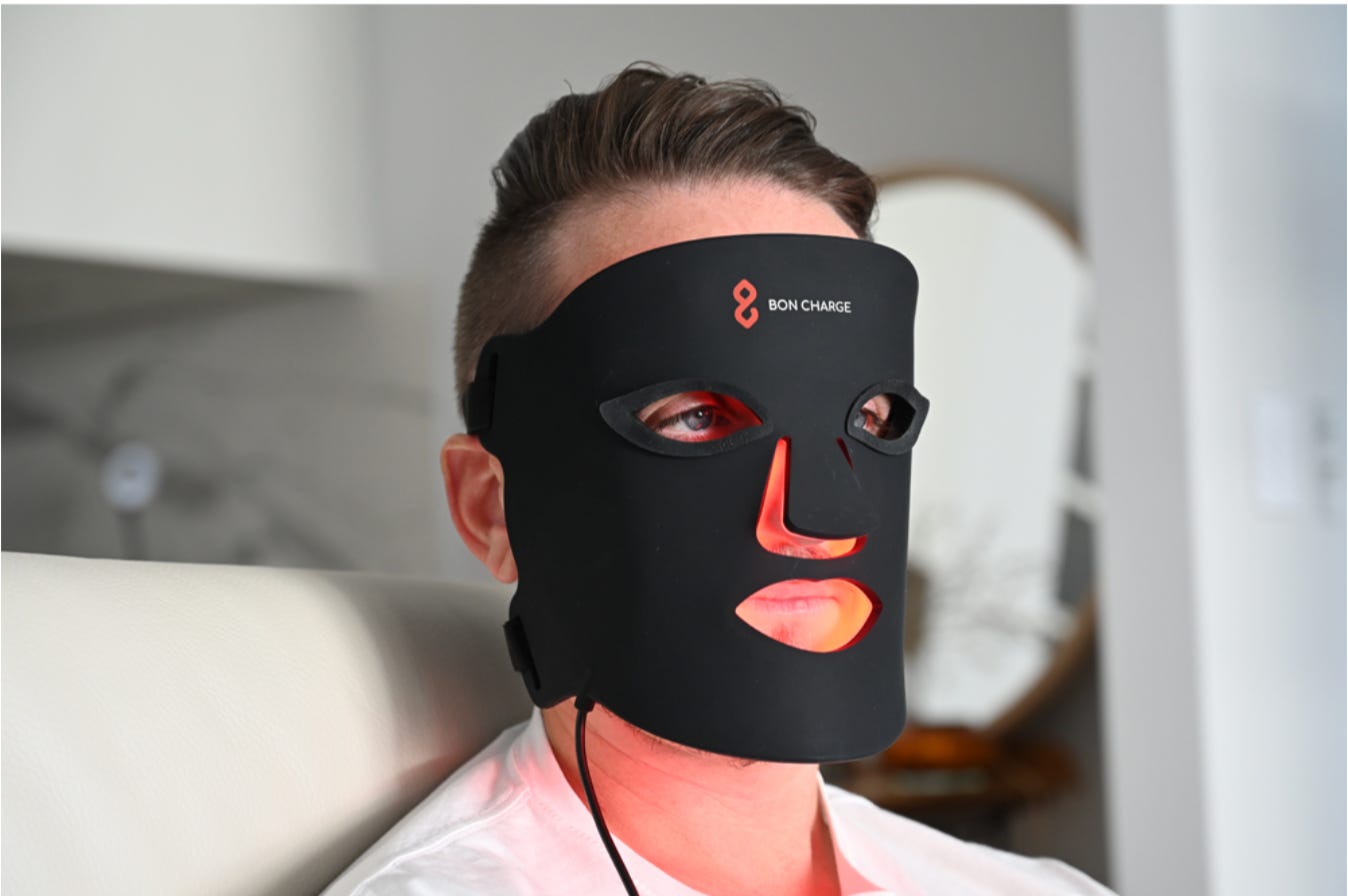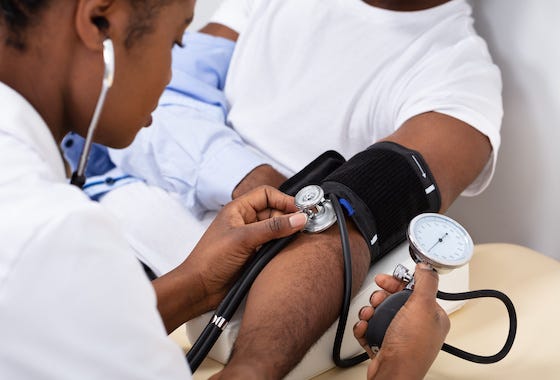How Lowering Your Blood Pressure Could Save Your Brain: The Surprising Link
The easiest metric to measure yet the hardest metric to manage
Neuro Athletics is a 2 x weekly newsletter that breaks down the medical and scientific practises that you need to perform at your peak. Subscribers include professional athletes, athletic trainers, coaches and casual fans. So if you are not already a subscriber, sign up and join 67,000+ others who receive it directly in their inbox each week — it’s free.
Today At A Glance:
68 million Americans – 1 in every 3 U.S. adults – have high blood pressure, and nearly 20 percent do not know they have it.
Today’s Newsletter Is Brought To You By BON CHARGE
BON CHARGE is not just another wellness brand. It’s a holistic solution for those who take their health seriously. From blue light glasses to red light therapy and EMF management, they've got everything to help you live better in our modern world.
Their Red Light Face Mask? It's my absolute favorite - I wear it every morning for 10 minutes.
Why I Love the Red Light Face Mask
This isn't just any face mask. It tackles everything from wrinkles and eczema to migraines and acne. What's more, it's backed by over 4,000 peer-reviewed studies. Just 10-20 minutes a day can make a world of difference. It's easy to use, effective, and super comfortable.
The Best Part?
BON CHARGE has outdone itself with this mask. It filters out sleep-disrupting light, combines NIR and Red light, emits zero EMF radiation, and has a sleek design. Plus, it comes with a 1-year warranty.
Ready to revolutionize your wellness routine?
Visit boncharge.com and use the code NEURO for a special 15% discount.
Neuro Athletes,
Here's a startling fact: a 2023 report from the American Heart Association revealed that over 122 million Americans — nearly half of the adult population — grapple with high blood pressure.
That's one in every three adults in the US. Astounding, isn't it?
This epidemic of hypertension, especially in midlife, is closely linked to an increased risk of cognitive decline and dementia, including Alzheimer's disease. It's more than just a number; it's a critical indicator of your brain's future health.
What's driving these high blood pressure numbers?
It often boils down to lifestyle choices. Insufficient physical activity is a major culprit. Plus, conditions like diabetes and obesity significantly hike up the risk.
Maintaining optimal blood pressure isn't just good practice; it's essential. The SPRINT trial, a major study in cardiovascular health, offered invaluable insights here. It showed clearly why keeping blood pressure under control is vital for our health.
So, if you're aiming to stay on top of your health game, focusing on your blood pressure is key. It's not just about avoiding health issues; it's about safeguarding your brain, staying sharp, and keeping your body in top shape. It's solid science, real, and something we all need to pay attention to.
The SPRINT Trial
I've always been deeply intrigued by the nuances of blood pressure management, and the SPRINT (Systolic Blood Pressure Intervention Trial) study was a real eye-opener for me. This groundbreaking research revolutionized how we think about controlling systolic blood pressure. Previously, medical professionals, myself included, often considered a blood pressure reading of 130-135 mm Hg as the upper limit of acceptable.
But here’s the twist: the SPRINT trial showed that maintaining systolic pressure at or below 120 mm Hg isn't just better – it's crucial.
Diving deeper into the study, I was struck by the meticulous methodology and the robustness of the data. The trial's findings indicated a significant reduction in the risks of major cardiovascular events, including heart attacks and strokes, among participants who maintained a systolic blood pressure of 120 mm Hg or lower. This wasn't just a marginal improvement; the results were a clarion call for a more aggressive stance in blood pressure management.
As a passionate advocate for heart and brain health, I find these results compelling. The implications for reducing mortality rates are profound. In my practice, this study has shifted my approach towards a more proactive and vigilant management of blood pressure. It's not just about hitting targets; it’s about understanding the dynamic interplay between blood pressure levels and the intricate workings of the cardiovascular system.
High Blood Pressure: A Silent Threat to the Brain
High blood pressure, often asymptomatic, is a silent threat that gradually damages the brain’s vascular network. Over time, it can lead to the narrowing and blocking of small blood vessels in the brain, reducing blood flow and oxygen supply, and potentially leading to cognitive decline, strokes, and other neurological conditions.
Blood pressure directly affects brain health. For every 10 mmHG increase in blood pressure, estimated brain age increased by ~65 days. A systolic blood pressure of <120 mmHG may be optimal for reducing risk of cerebral small vessel disease & dementia.
Measuring Blood Pressure Accurately: A Critical Step
Accurate blood pressure measurement is paramount. Blood pressure readings in clinical settings can often be misleading due to factors like white coat hypertension. They recommend:
Sitting calmly for at least five minutes before taking a measurement.
Using a manual cuff for more accurate readings, though automated cuffs are still useful.
Consistently checking blood pressure at home, ideally twice a day, and keeping a record for analysis.
Lifestyle Interventions for Blood Pressure Management
Lifestyle interventions play a crucial role in managing blood pressure. Simple changes in diet, exercise, and stress management can have profound effects:
Regular cardiovascular exercise significantly lowers blood pressure.
Dietary modifications, including the incorporation of cocoa flavanols and green leafy vegetables, can improve vascular health.
Heat therapy, such as using saunas or hot tubs, may lower blood pressure, especially in stress-prone individuals.
3 grams of daily omega-3 (EPA+DHA, higher dose) supplementation lowered systolic blood pressure by ~4.5 mmHg in people with high blood pressure and by 2 mmHg in people with normal blood pressure (meta-analysis of 71 randomized placebo-controlled trials).
The Future of Blood Pressure Monitoring
Advancements in technology promise more accurate and continuous blood pressure monitoring. Devices like wearable blood pressure monitors could revolutionize how we track and manage blood pressure, allowing for more personalized and effective treatment strategies.
This probably doesn’t feel like a real problem to most people, but it’s important to remember that 68 million Americans – 1 in every 3 U.S. adults – have high blood pressure, and nearly 20 percent do not know they have it. Prevention is better than cure!
I hope you enjoyed this one team.
Until next time,
Louisa









Thanks for sharing this! I learned something new.. was not aware of the effect on the brain..
Anybody ever get a blood pressure measurement in a doctor's office the proper way?
I'm not sure they even have manual cuffs or know how to use them. And they rush you in and barrage you with questions to fill out their form as they take bp with the automated cuff.
I'd love to do it myself if I knew how to do it accurately and what equipment is most accurate.
VO2 max > 50 is what I'm hoping helps me out since BP measurement is so questionable 🤷🏻♀️